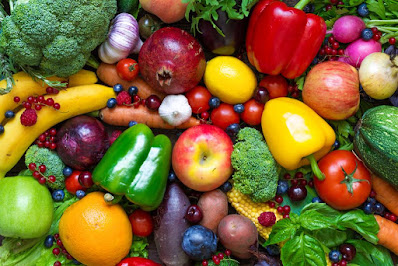1. Base your meals on higher fibre starchy carbohydrates
Starchy carbohydrates should make up just over a third of the food you eat. They include potatoes, bread, rice, pasta and cereals.
Choose higher fibre or wholegrain varieties, such as wholewheat pasta, brown rice or potatoes with their skins on.
They contain more fibre than white or refined starchy carbohydrates and can help you feel full for longer.
Keep an eye on the fats you add when you're cooking or serving these types of foods because that's what increases the calorie content – for example, oil on chips, butter on bread and creamy sauces on pasta.
2. Eat lots of fruit and veg
It's recommended that you eat at least 5 portions of a variety of fruit and veg every day. They can be fresh, frozen, canned, dried or juiced.
Getting your 5 A Day is easier than it sounds. Why not chop a banana over your breakfast cereal, or swap your usual mid-morning snack for a piece of fresh fruit?
A portion of fresh, canned or frozen fruit and vegetables is 80g. A portion of dried fruit (which should be kept to mealtimes) is 30g.
A 150ml glass of fruit juice, vegetable juice or smoothie also counts as 1 portion, but limit the amount you have to no more than 1 glass a day as these drinks are sugary and can damage your teeth.
3. Eat more fish, including a portion of oily fish
Fish is a good source of protein and contains many vitamins and minerals.
Aim to eat at least 2 portions of fish a week, including at least 1 portion of oily fish.
Oily fish are high in omega-3 fats, which may help prevent heart disease.
4. Eat less salt: no more than 6g a day for adults
Eating too much salt can raise your blood pressure. People with high blood pressure are more likely to develop heart disease or have a stroke.
Even if you do not add salt to your food, you may still be eating too much.
About three-quarters of the salt you eat is already in the food when you buy it, such as breakfast cereals, soups, breads and sauces.
5. Do not skip breakfast
Some people skip breakfast because they think it'll help them lose weight.
But a healthy breakfast high in fibre and low in fat, sugar and salt can form part of a balanced diet, and can help you get the nutrients you need for good health.
A wholegain lower sugar cereal with semi-skimmed milk and fruit sliced over the top is a tasty and healthier breakfast.


No comments:
Post a Comment